Cialis for Erectile Dysfunction: Uses, Benefits, Risks, and Dosage
Written by Dr. Sharon Kumar

With a strong academic background in dentistry and clinical exposure, Dr. Sharon who has studied at PDM Dental College, brings a valuable blend of medical knowledge and communication skills to health content writing. She is passionate about creating clear, compassionate, and evidence-based content on topics such as general wellness, sexual health, oral care, and patient education. Her goal is to make complex medical information easy to understand, relatable, and genuinely helpful for readers seeking clarity on their health concerns. Dr. Sharon believes in the power of well-researched, empathetic content to educate and empower people to make better health decisions. Whether it’s writing about preventive care or breaking down myths in sexual wellness, her content always balances science with sensitivity.
•
September 12, 2025
Our experts continually monitor the health and wellness space, and we update our articles when new information becomes available.
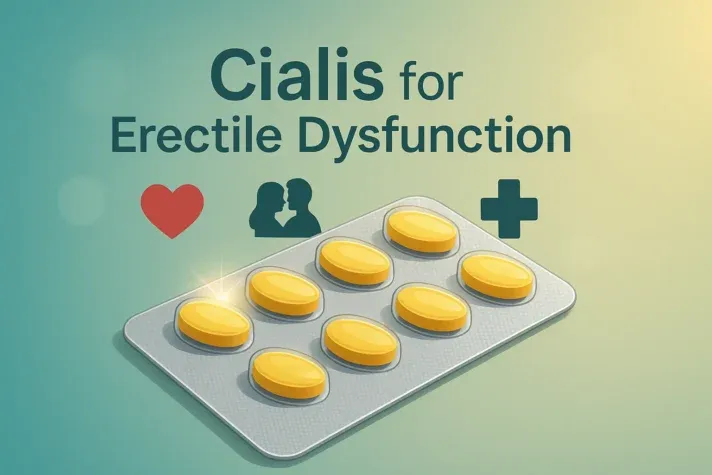
Quick Read
Cialis for erectile dysfunction (ED) is one of the most trusted treatments for men facing erection difficulties. The active ingredient, tadalafil, works by improving blood flow to the penis, helping men achieve and maintain a firm Cialis erection during sexual activity. Often called the “weekend pill,” it can last up to 36 hours, offering flexibility and reducing performance anxiety. Beyond treating ED, Cialis also helps with benign prostatic hyperplasia (BPH). While many men find it effective for Cialis impotence concerns, possible side effects include headache, flushing, or indigestion. Always consult a doctor before starting Cialis for erectile dysfunction.
Erectile dysfunction (ED) is a common condition that affects men of all ages and can impact sexual health. This condition often stems from problems with blood flow to blood vessels in the penis, sexual arousal difficulties, or underlying health conditions. Cialis for erectile dysfunction is one of the most popular medications used to treat this condition, offering hope for improved sexual activity and partner satisfaction. If you're considering Cialis as an erectile dysfunction treatment, it's essential to understand how this active ingredient works, its benefits, dosage, and potential risks.
What is Cialis for Erectile Dysfunction?
Tadalafil is the active ingredient in Cialis, and it is used to treat erectile dysfunction. It belongs to a group of drugs or medications called PDE5 inhibitors, also known as phosphodiesterase-5 inhibitors. The Food and Drug Administration [1] has approved this active ingredient for erectile dysfunction. It is also approved to treat a condition called benign prostatic hyperplasia and pulmonary arterial hypertension. Pulmonary Arterial Hypertension (PAH) [2] is a rare condition where the arteries in the lungs become narrowed and stiff, causing high blood pressure. This may even lead to heart failure. When you experience sexual stimulation, Cialis helps relax muscle tissue in blood vessels or pipes through which blood flows. This allows improved blood flow to the empty compartments (corpus cavernosum) of the penis. Corpus Cavernosum is the erectile tissue of the penis. This results in a firmer erection. This medicinal/pharmacologic treatment makes it easier to achieve and retain a penile erection during sexual intercourse. ED medications such as sildenafil citrate (Viagra) and Cialis for erectile dysfunction offer a unique advantage with their extra duration of effect: it can last up to 36 hours, making it known as the "weekend pill."
“One of the biggest advantages of Cialis is its long duration of action. Knowing it works for up to 36 hours can reduce performance anxiety and make intimacy feel more natural.”
The longer effect lets men be more unplanned with sex. It lowers performance anxiety. Men prefer it over medicines that need exact timing.
Allo asks
What is the most important factor for you when choosing an ED treatment?
How Does Cialis Work for Erectile Dysfunction?
When you take Cialis for erectile dysfunction, it works by blocking an enzyme (phosphodiesterase type-5, PDE5). This enzyme usually limits blood flow to the penis. By stopping this enzyme, Cialis helps keep levels of a molecule (cyclic guanosine monophosphate, cGMP) high in the blood vessels of the penis.
Sexual Arousal
↓
Release of Nitric Oxide
↓
Increase in cGMP Production
↓
Smooth Muscles in Blood Vessels Relax
↓
Increased Blood Flow to the Penis
↓
Erection Occurs
Not only does Cialis help with erectile dysfunction, but it also helps with symptoms of benign prostatic hyperplasia (BPH) by relaxing smooth muscles in the prostate and bladder, making it easier to urinate.
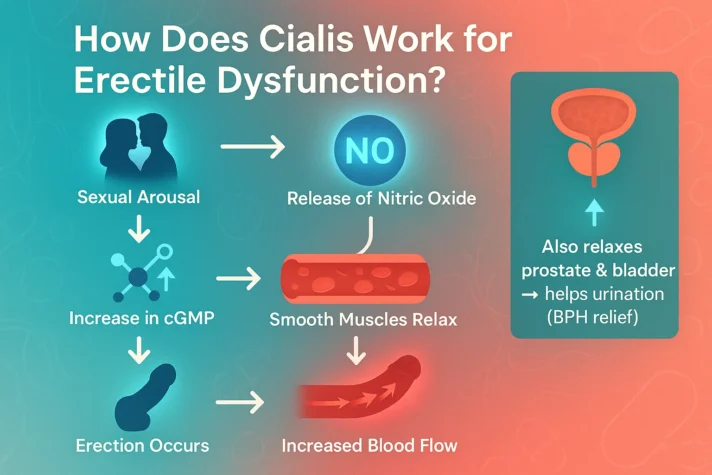
Benefits of Cialis for Erectile Dysfunction
Using Cialis for erectile dysfunction has numerous advantages, making it a preferred choice among impotence agents:
1. Long-Lasting Effects
- One of the most important benefits of Cialis impotence treatment is its extended duration of effect, working for up to 36 hours.
- Cialis gives a longer time for sexual activity than other medicines.
- Other medicines usually last 4 to 6 hours. This longer time improves partner satisfaction.
2. Flexible Dosage Options
- Cialis is available in multiple forms: as-needed dosing for occasional use and daily use options.
- The daily version, often available as an oral suspension for some patients, allows men to maintain consistent medication levels, supporting ongoing sexual function regardless of planned sexual activity.
3. Proven Effectiveness in Clinical Trials
- Multiple blinded trial studies have demonstrated Cialis's effectiveness in improving erectile function across various age groups and underlying conditions. [3]
- Research using the International Index of Erectile Function has shown a significant improvement in erection quality. [4]
- It also shows better sexual satisfaction, even in hard cases with nerve injury or after radical prostatectomy [5].
4. Dual Benefits for Multiple Conditions
For men with both ED and benign prostatic hyperplasia, Cialis treats both problems at the same time. It helps lower urinary tract symptoms and improves erectile function.
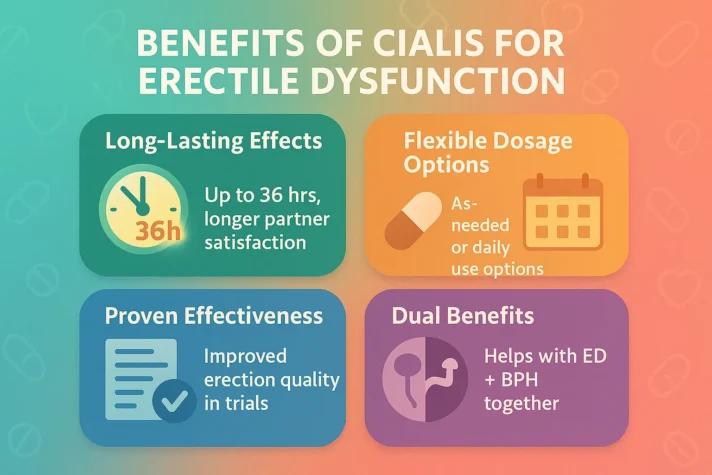
Cialis Dosage for Erectile Dysfunction
The Cialis dosage for erectile dysfunction varies based on your specific needs, person to person, and medical history:
As-Needed Dosage for Erectile Dysfunction:
1. Starting Dose
10 mg, taken before sexual intercourse, at least 30 minutes before sexual activity
2. Dose Adjustment
Depending on effectiveness and tolerability, the dose can be increased to 20 mg or decreased to 5 mg
3. Maximum Frequency
Should not be taken more than once per day
4. Duration of Effect
Effects can last up to 36 hours
Daily Dosage for Erectile Dysfunction:
1. Starting Dose
2.5 mg, taken at approximately the same time every day, regardless of sexual activity
2. Dose Adjustment
May be increased to 5 mg based on individual response
3. Consistency
Taken once daily to maintain steady medication levels
Combined Treatment Dosage:
For men with both erectile dysfunction and benign prostatic hyperplasia, the recommended daily dose is 5 mg, addressing both conditions simultaneously.
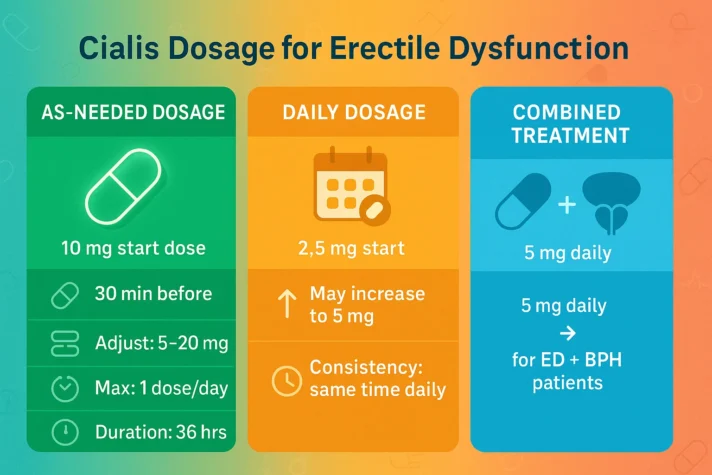
Medical Considerations and Contraindications
Before starting Cialis treatment, it's important to discuss your complete medical history with your healthcare provider, particularly if you have:
Cardiovascular Conditions
1. Heart disease or coronary artery disease
Patients with heart problems [6] should be carefully evaluated
2. Recent heart attack
Those who have experienced a heart attack [7] within the past 90 days should avoid Cialis
3. Blood pressure concerns
Both high and low blood pressure [8] can be affected by this medication
Eye and Vision Conditions
1. Retinitis pigmentosa
Retinitis pigmentosa [9] is an inherited eye condition that may increase the risk of vision loss
2. Previous vision loss
Any history of sudden vision changes should be discussed
Blood and Circulation Disorders
1. Sickle cell anemia
Sickle Cell Anemia [10] is a condition that can increase the risk of prolonged erections
2. Blood vessel disorders
Various vascular conditions or blood vessel conditions may affect how the medication works
Other Medical Conditions
1. Kidney disease
Kidney diseases may require dosage adjustments.
2. Liver disease
It can affect how the body processes the medication.
3. Peyronie's disease
A condition affecting penile shape that may complicate treatment.
4. Prostate cancer or prostatic carcinoma
Treatment history should be discussed.
5. Pulmonary hypertension or pulmonary veno-occlusive disease
May contraindicate use
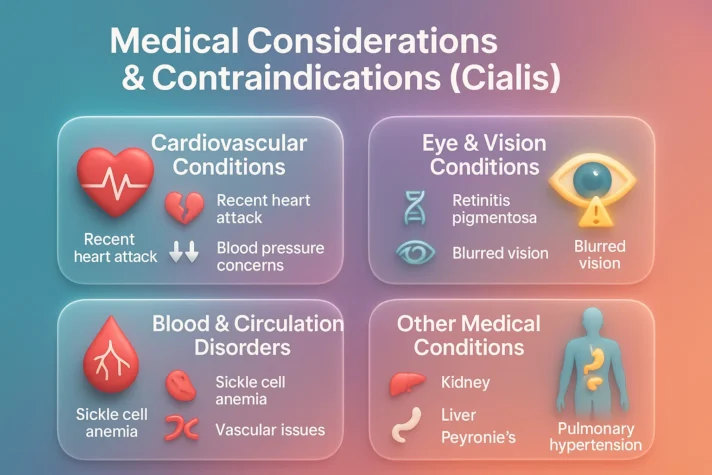
Drug Interactions and Safety Precautions for Cialis
Never combine Cialis with:
- Nitrate drugs, including isosorbide dinitrate and isosorbide mononitrate, can cause dangerous drops in blood pressure when used in combination.
- Other PDE5 inhibitors should be avoided due to potentially serious side effects
- Alpha-blockers are used for benign prostatic hypertrophy
- CYP3A4 inhibitors
- Blood pressure medications
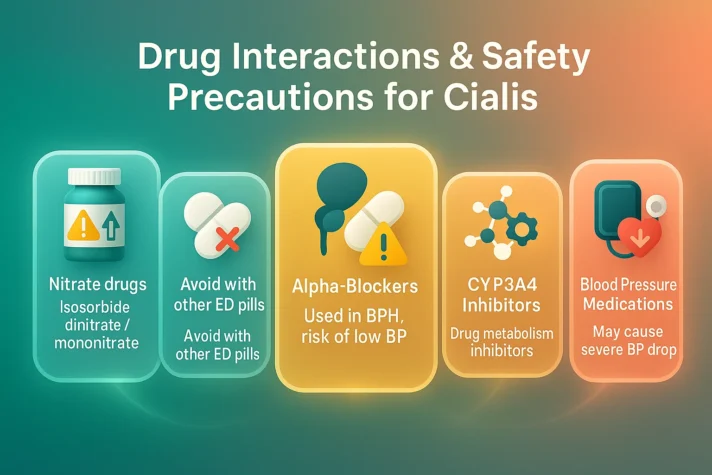
Side Effects and Risks of Cialis
While Cialis is generally well-tolerated, potential side effects may include:
Common Side Effects:
- Headaches
- Flushing
- Nasal congestion
- Indigestion
- Back pain and muscle aches
Serious Side Effects Requiring Immediate Medical Attention:
- Priapism: A prolonged, painful erection lasting more than 4 hours
- Sudden vision loss: Particularly in patients with retinitis pigmentosa
- Sudden hearing loss
- Chest pain or heart-related symptoms
- Severe drops in blood pressure
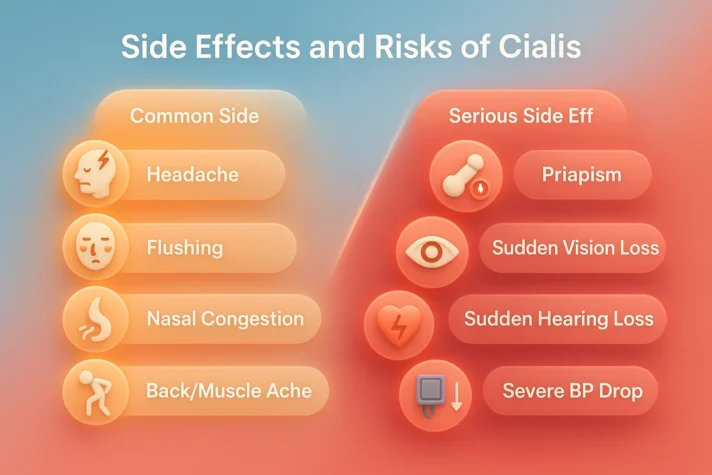
Lifestyle Considerations
Alcohol and Sexual Activity
Limit alcohol consumption while using Cialis, as excessive drinking can increase the risk of side effects like dizziness and problematic drops in blood pressure during sexual intercourse.
Sexual Arousal and Effectiveness
Remember that Cialis requires natural sexual stimulation to be effective. The medication enhances the body's natural response to sexual arousal but doesn't create arousal independently.
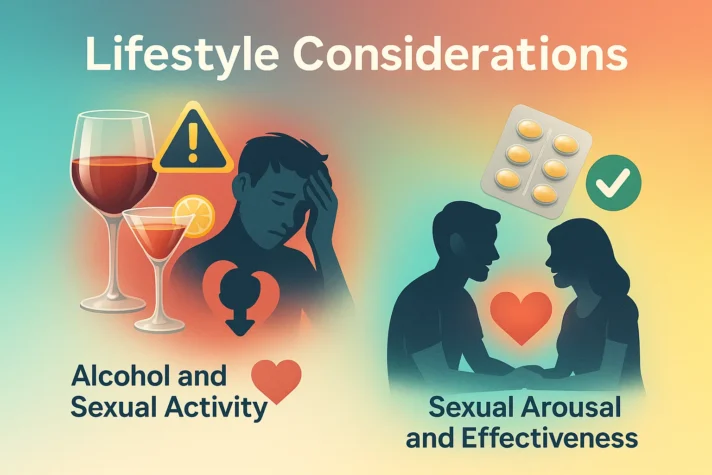
Is Cialis Right for You?
If you're experiencing erectile dysfunction, Cialis may be an excellent option for improving your sexual health and partner satisfaction. The ability to choose between as-needed or daily dosing, combined with its long duration of effect, makes Cialis one of the most flexible treatments among available impotence agents. However, given the complexity of potential drug interactions, underlying medical conditions, and individual health factors, it's essential to consult with a healthcare provider who can:
- Evaluate your complete medical history
- Review current medications for potential interactions
- Assess cardiovascular health and blood pressure
- Determine the most appropriate dosage
- Monitor for side effects and effectiveness
- Consider alternative treatments if needed
Your healthcare provider may suggest extra resources. These include a symptom checker or referral to specialists for a full check of conditions causing erectile dysfunction. Remember that erectile dysfunction can often be treated successfully. Cialis is just one option among many phosphodiesterase-5 inhibitors and other treatments. With proper medical guidance, many men find significant improvement in their sexual function and overall quality of life.
Disclaimer
The following blog article provides general information and insights on various topics. However, it is important to note that the information presented is not intended as professional advice in any specific field or area. The content of this blog is for general educational and informational purposes only. The content should not be interpreted as endorsement, recommendation, or guarantee of any product, service, or information mentioned. Readers are solely responsible for the decisions and actions they take based on the information provided in this blog. It is essential to exercise individual judgment, critical thinking, and personal responsibility when applying or implementing any information or suggestions discussed in the blog.
Most Asked Questions
Can I drink alcohol while taking Cialis?
Small amounts are usually fine, but excessive drinking can increase risks of dizziness, low blood pressure, or fainting.
Does Cialis work without sexual stimulation?
No. Cialis supports your body’s natural response, but sexual arousal is required for it to be effective.
What’s the difference between Cialis and Viagra?
Viagra works for 4–6 hours, while Cialis lasts up to 36 hours and can be taken daily.
Can Cialis cause permanent damage?
Serious side effects are rare. However, conditions like priapism (erection lasting 4+ hours) need immediate medical care to avoid long-term issues.
Can women take Cialis?
Cialis is approved only for men. Research into its use for women is ongoing but not yet conclusive.
Is generic Cialis available?
Yes. Generic Tadalafil is available and works the same as brand-name Cialis, usually at a lower cost.
Sources
- 1.
Food and Drug Administration
- 2.
Pulmonary Arterial Hypertension (PAH)
- 3.
Efficacy of tadalafil for the treatment of erectile dysfunction at 24 and 36 hours after dosing: a randomized controlled trial
- 4.
Efficacy and Safety of Tadalafil in Men With Erectile Dysfunction Following Spinal Cord Injury
- 5.
Radical Prostatectomy
- 6.
Heart disease
- 7.
Heart attack
- 8.
Understanding Blood Pressure Readings
- 9.
Retinitis Pigmentosa
- 10.
Sickle cell anemia


